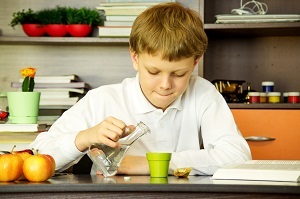

<p><img class=" alignright size-full wp-image-1963" style="margin: 5px; float: right;" alt="SND-22-wk 2-University opens science club" src="http://schoolnewsnz.fastrackdev.com/wp-content/uploads/2015/12/SND-22-wk_2-University_opens_science_club.jpg" width="300" height="199" />A pilot project that will help connect children&#8217;s innate curiosity with real life science is about to start at the University of Otago, Wellington. <!--more--> </p>
<p>The University of Otago, Wellington (UOW) and other groups will run a weekly science club with students from Māoribank and Pinehaven Schools in Upper Hutt to explore how our bodies work, especially the heart and lungs, emphasising the relationship between exercise and health.</p>
<p>&#8220;Kids are naturally curious about the world they live in. We need to foster this innate drive to learn, and help them discover more about how and why things work,&#8221; says project leader Dr Max Berry, senior paediatrician at the University of Otago, Wellington.</p>
<p>&#8220;We&#8217;ll be working with the children&#8217;s classroom teachers and combining their expertise with that of clinicians and scientists across the Wellington region to really do something different.</p>
<p>&#8220;Science should be accessible, fun and relevant for these kids – and that&#8217;s what this project is all about,&#8221; she says.</p>
<p>&#8220;We&#8217;ll be supporting classroom learning with a visit to the UOW Centre for Translational Physiology where we can show them science in action. We&#8217;ll work with them on topics of exercise and health, hygiene and our environment as well as the effects of sugar-based drinks on oral health,&#8221; Dr Berry says.</p>
<p>&#8220;Seeing science in action and with practical applications will pique the children&#8217;s interest and help them relate real life problems to science.</p>
<p>&#8220;The Year 7-11 students will become science ambassadors for their schools and take the knowledge and the excitement back to school.&#8221;</p>
<p>Funding for this pilot project comes from the 2015 Unlocking Curious Minds contestable fund pilot and will be expanded if successful.</p>
<p> ;</p>
<p> ;</p></p>

NZCER found generative AI tools are frequently used to support teaching and learning in primary…
The Ministry decision to discontinue a reading resource over kupu Māori has angered the sector…
NCEA was designed to broaden educational success, explains David Pomeroy from the University of Canterbury.
More than just a break from the classroom, a visit to a zoo or wildlife…
Without proper maintenance and care, trees can become a hazard. Are your trees in need…
Loneliness and social disconnection negatively impact wellbeing. A new WHO report finds teens feel the…
This website uses cookies.